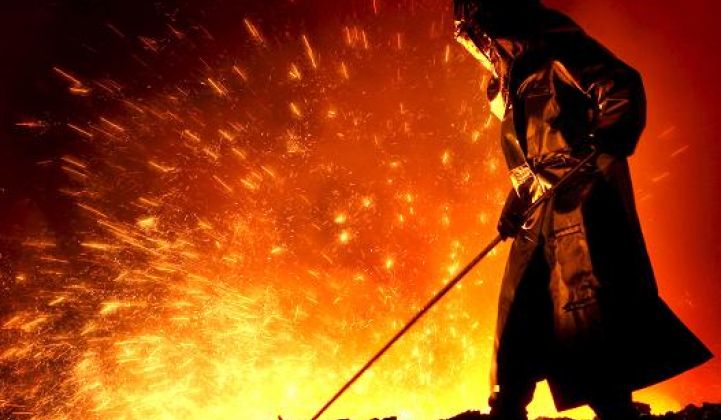LanzaTech, a waste-gas-to-fuel and chemicals startup, closed an extended and oversubscribed $112 million funding round D with a $60 million investment from the New Zealand Superannuation Fund, a sovereign wealth fund. NZ Super joins existing investors, including Mitsui, Siemens, CICC Growth Capital Fund, Khosla Ventures, Qiming Venture Partners, K1W1 and the Malaysian Life Sciences Capital Fund. LanzaTech has raised a total of $160 million with Khosla Ventures, which is the largest shareholder in the gas fermentation technology firm.
According to VC investor Vinod Khosla in a previous interview, LanzaTech takes flue gases from steel mills' exhaust and converts the flue gas to butanol, ethanol, or propanol. Khosla called the prospect of taking a waste stream and transforming it into something useful a "perfect project" that "could turn more profit from the steel mill than the steel itself."
The company uses a bacterium for its fermentation, Clostridium autoethanogenum, which eats carbon monoxide and emits ethanol "without using water or land resources," according to Prabhakar Nair, VP of business development in Asia for LanzaTech.
Andrew Chung, a partner at Khosla Ventures who serves on the board of LanzaTech, claims, “LanzaTech offers an effective and capital efficient carbon capture-and-reuse solution, which is why we have been able to fund commercialization via major industrial partners.” He notes that LanzaTech is developing fully funded joint ventures "on multiple continents with multiple partners."
Chung suggests, "LanzaTech is a prime example of a U.S.-China tech collaboration to curb emissions -- very timely given the recent Obama-Xi Jinping climate accord in Beijing, where China made its first-ever commitment to stop its emissions from growing by 2030."
"We’ve now launched joint ventures with two of the top steelmakers in China -- Baosteel and Capitol Steel -- and we have partnerships with more than ten other global companies," according to Chung.
LanzaTech claims that its gas fermentation platform "disrupts the current highly centralized global energy system by enabling the regional production of low-cost energy from local wastes and residues, including gases as varied as industrial flue gas, gasified biomass wastes and residues, biogas, and high-CO2 stranded natural gas."
Robert Rapier has some biofuel expertise and harbors some reservations about the LanzaTech technology. He suggests that the ethanol tolerance of the bacterium and the ethanol concentrations achieved by LanzaTech produce a solution that is mostly water along with "a relatively large distillation energy requirement. At a certain point, you expend as much energy removing the water as is contained in the product you are extracting." Rapier suggests, "This situation could be avoided if you just did a gas phase reaction to the products instead of fermenting the CO. Why would you do a fermentation instead of a gas phase reaction? In my opinion, it’s because one approach qualifies for subsidies and/or mandates and one does not."
LanzaTech CEO Jennifer Holmgren responds to Rapier point-by-point on a biofuels blog and suggests that the low-cost energy input is “low-value waste heat.” Rapier counters, "The reason low-value waste heat sources exist is because their temperature is too low to create steam. That’s what makes them 'low value.' If they could produce steam, there are more logical places to use it." Rapier suggests, "It’s a pretty good bet that the process essentially requires free energy for the economics to work. If I was evaluating LanzaTech as an investment opportunity, I would pay particular attention to the carbon monoxide conversion and selectivity to ethanol, the concentration of ethanol achieved, and the energy requirements for the distillation."
Rapier has referred to Khosla Ventures' biofuel efforts as "a debacle, with billions of investor dollars and tax dollars flushed down the toilet. What Khosla didn’t appreciate is that he isn’t smarter than the people in the oil industry." Rapier notes the hype and limited success encountered by Range Fuels, KiOR, Amyris and Gevo and suggests that Khosla has not had a single success in the advanced biofuels arena, defined as "economically producing biofuels at scale."
Despite the constancy of the laws of thermodynamics and the assumed deep due diligence on this technology, LanzaTech and its global investors believe the economics of its process will be net-positive, while Rapier and others see this process as a net energy loss.
Big money is being invested, and the technology is being deployed. LanzaTech’s first commercial plant is targeted to begin operation in 2016. And the final verdict on the economics of this technology may have to wait until then.



